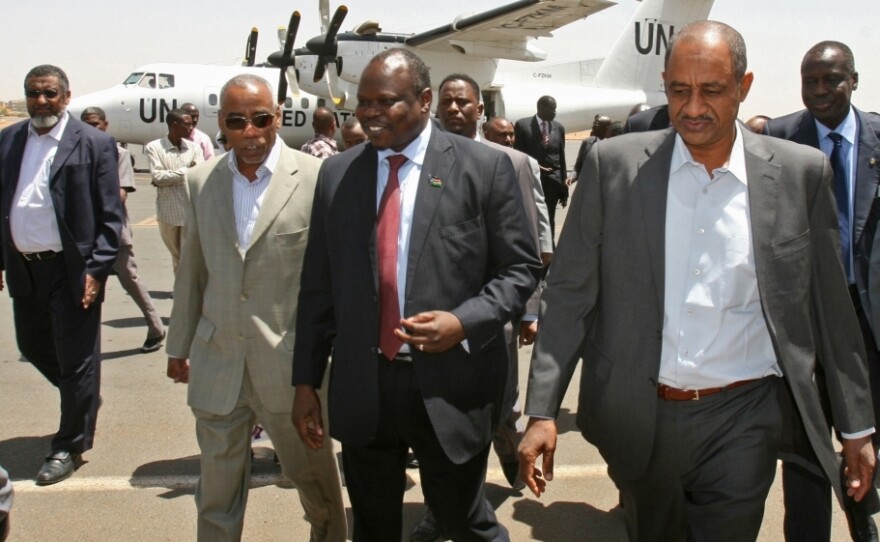Less than a year after they formally split, Sudan and South Sudan appear to be in danger of going to war.
Fighting spilled over the disputed border this week, scuttling a planned summit intended to resolve issues lingering from South Sudan's independence last July.
International diplomats are trying to get that summit back on track and deal with a humanitarian crisis that is looming in the region.
Journalist Aidan Hartley recently spent two weeks in Sudan's Nuba Mountains working on stories for Britain's Channel 4 television. He says civilians near the border are starving and under daily bombardment from Sudan's air force.
"You can see the terror that it sows in the population," he said. "They've run from their villages and are living in caves in the mountains or they've dug foxholes."
Hartley says he saw empty warehouses where U.N. agencies once stocked food for people in the region.
Aid Groups Blocked
Sudan won't give aid groups access to the Nuba Mountains.
"We understand that the NGOs want to make sure that the aid gets to the needy," says Sudanese negotiator Said al-Khatib. "The government wants to make sure that aid gets to the needy and not to the fighting rebel groups."

Sudan accuses South Sudan of supporting rebels in the Nuba Mountains, on the Sudanese side of the border. U.S. diplomats have been trying to get both sides out of the business of aiding proxies.
Secretary of State Hillary Clinton described the violence that spilled across the border as deeply distressing, and she was particularly critical of Sudan.
"We think that the weight of responsibility rests with [Sudan], because the use of heavy weaponry, bombing runs by planes and the like are certainly evidence of disproportionate force on the part of the government in Khartoum," she said.
Sudanese President Omar al-Bashir postponed plans to visit South Sudan for a crucial summit meeting. Clinton says she hopes the two leaders will meet soon.
"You know you don't make peace with your friends," Clinton said. "There are decades of grievances that have to be overcome in order to work through these very challenging issues. But it is incumbent upon the leaders of both countries to attempt to do so."
The irony is that the last round of talks seemed to be moving in the right direction, according al-Khatib, the negotiator from Sudan.
Speaking at the Sudanese Embassy in Washington, he says there was a new atmosphere in talks over sharing oil, most of which is found in South Sudan, but is exported via a pipeline that runs through Sudan.
"The common interest is so clear for everyone to see," he says. The people in South Sudan "are not going to benefit from their oil wealth without an agreement with us. We are not going to benefit from our infrastructure without being reasonable and coming to agreement. It's very clear that it's in the interest of both sides to agree quickly."
South Sudan shut down its oil production this year and accuses Sudan of bombing an oil field.
China, a key importer of Sudanese oil, is now playing an important diplomatic role. And that has meant a more united position from the U.N. Security Council, which has called on the two Sudans to exercise maximum restraint.
Copyright 2023 NPR. To see more, visit https://www.npr.org. 9(MDAzMjM2NDYzMDEyMzc1Njk5NjAxNzY3OQ001))







